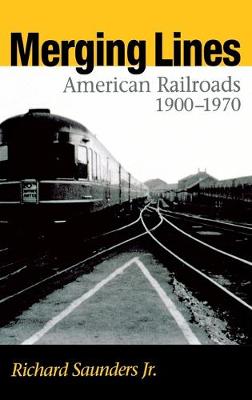Railroads in America
1 total work
Why did American railroads decline from the glory days of the early twentieth century? Why did so many railroad mergers in the 1950s and 1960s, intended as a panacea for the ills of an outdated system, go sour and, in fact, make a bad situation worse? Saunders addresses these and many other issues in this authoritative history of US railroads and their corporate mergers.
Beginning with a wide-ranging analysis of the role of railroads in the economic and social fabric of American life, Saunders traces the causes and results of the twentieth century's "merger mania." Mergers, he explains, were expected to save money, to improve service to customers, and to help railroads compete against other modes of transportation, such as the growing airline and trucking industries. Saunders then gives colorful, richly detailed accounts of the mergers and shows the reasons-including corporate greed and the inept blundering of government regulatory agencies-the outcomes fell far short of expectations.
Merging Lines explores the impact of shifting political control of railroads as no history has done before. The fates of both workers and railroad companies were dictated by the rise and fall of business and governmental leaders, including Bill Brosnan, Robert R. Young, Alfred Perlman, President John F. Kennedy, and President Lyndon B. Johnson. As power struggles erupted, the original goals of the mergers were thwarted by consumer frustration, violent labor strikes, and organizational collapse. Saunders explores these and other crucial developments in this extensive work, carefully designed for railroad historians and enthusiasts at any level.
Encyclopedic in its scope, Merging Lines includes sixty-eight maps, a list of court cases involving railroad mergers, and a wealth of information on American railroads from coast to coast. An extensively revised, updated, and supplemented edition of Saunders's earlier classic, The Railroad Mergers and the Coming of Conrail (1978), it is essential reading for all who are interested in railroad and transportation history.
